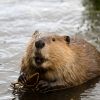
Government plans to capture Devon beavers may be unlawful
Friends of the Earth has called for an immediate halt to Government plans to capture wild beavers on the River Otter in Devon, warning that any such moves may be unlawful.
In a letter sent to Environment Secretary Liz Truss, the environmental charity outlined its concerns regarding the legality of capturing the beavers, explaining that since Britain formed part of the natural range of beavers - and since there were already free living populations in Scotland - they should be covered by EU laws governing protected species.
In 2013 it was reported that there was a small population of European beavers living and breeding near the River Otter in Devon. Earlier this year the Government signalled its intention to trap them and re-home them in a captive facility.
In a recent meeting in the village of Ottery St. Mary more than a hundred local people, including Councillors, voiced their support for allowing the beavers to remain.
Friends of the Earth Campaigner Alasdair Cameron said: “Beavers belong in England, and are an essential part of our ecosystems – Government plans to trap them should be scrapped.
“Beavers bring huge benefits to the environment – reducing flooding and boosting fish stocks and biodiversity. Rather than try and get rid of them, we should be thrilled to have them back in our landscape.
“The Government needs to listen to what local people are saying, instead of taking a knee-jerk response. This is a fantastic opportunity to study the return of a beautiful and iconic creature.
“The Government says it needs to remove these beavers because of the threat of disease, but that’s just an excuse. They are very unlikely to be carrying infection, having been born in the wild or already quarantined. In any case they could be easily tested and returned to the river.”
Aside from the beavers in Devon there are several other populations in Britain. They are present in the west of Scotland where an official trial reintroduction of 16 beavers is due to end successfully next year, while a second much larger free population of more than 150 animals is already established on the Tay River in Perthshire.

















